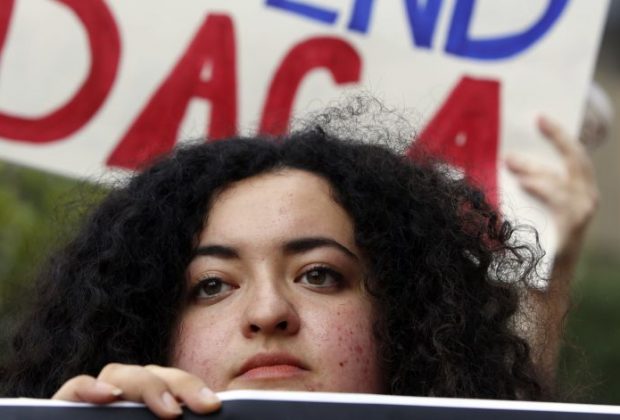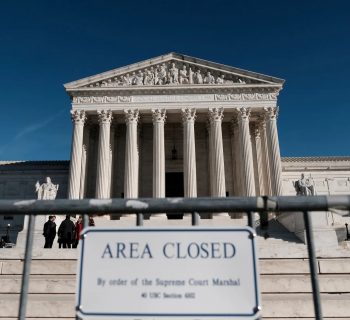By Brent Kendall ~ Wallstreet Journal ~ November 8, 2018
President Trump’s bid to cancel a program benefiting undocumented immigrants who came to the U.S. as children was rejected by an appeals court Thursday, setting the stage for the Supreme Court to review one of the president’s signature initiatives on immigration.
The ruling, by a three-judge panel of the San Francisco-based Ninth U.S. Circuit Court of Appeals, said the administration voiced flawed and inadequate reasons for its decision in September 2017 to terminate the Obama-era program called Deferred Action for Childhood Arrivals, or DACA.
The decision is in line with similar rulings by multiple trial judges who found the administration’s cancellation legally deficient. The Trump administration has already sought to have the issue reviewed by the Supreme Court, which typically prefers to have the final say when a government program or major executive action is invalidated by a lower court.
The case could present one of the biggest early challenges for the high court since Justice Brett Kavanaugh joined the bench. The court in recent years has divided in some key immigration cases, including in June when a 5-4 court upheld a revised version of Mr. Trump’s ban on travel from citizens of several countries on antiterrorism grounds. The justices also deadlocked on a major Obama-era immigration case in 2016 after Justice Antonin Scalia died.
Canceling DACA has been one of several actions by Mr. Trump to change U.S. policy on immigration, a topic that has sparked strong feelings among his supporters and opponents alike and that ranked second, after health care, as an issue for voters in Tuesday’s election, according to an Associated Press survey of about 90,000 people.
The administration said Thursday it was also moving ahead with a plan to limit when and where foreign nationals can apply for asylum at the U.S. border with Mexico. It said it would publish a new rule aimed at pushing asylum seekers to already crowded border crossings and deny nearly all immigrants caught crossing the border illegally the opportunity to apply for asylum. Critics said that rule oversteps the president’s legal authority to change immigration law, an issue that could also end up in court.
The immigration fight took on a greater intensity in the lead-up to the midterm election, as the president focused in speeches and rallies on a group of thousands of mostly Central American migrants making their way to the U.S. in multiple caravans traveling through Mexico. Nearly 8,000 troops have been deployed to the border in anticipation of their arrival.
Mr. Trump has also promised an executive order that would end automatic citizenship for those born on U.S. soil. Many legal experts question the president’s authority to do that, since birthright citizenship is guaranteed in the Constitution. Asked this week about those plans, Mr. Trump said, “I believe we have the absolute right. But that’s another case that will be determined by the Supreme Court of the United States.”
Mr. Trump also continues to push for funding to build a wall on the U.S. border with Mexico. He has openly advocated shutting down the government if Congress doesn’t give him more money for the wall, a battle likely to play out in the coming weeks as funding for parts of the government expires Dec. 8.
The president’s travel ban applies to citizens from several countries, including those with Muslim majorities, though that measure has been scaled back after earlier adverse court rulings. And his administration has said it is lowering the cap for refugees admitted to the U.S. to 30,000 in fiscal 2019, the lowest since the program began in 1980.
The appeals court in its ruling on DACA Thursday said the Trump administration based its cancellation of the program on the erroneous legal premise that it was unconstitutional. “DACA was a permissible exercise of executive discretion,” the court said.
DACA offered two-year renewable grants to participants allowing them to live and work in the U.S. without fear of deportation. Roughly 800,000 people have participated in the program.
The Obama administration implemented the program in 2012. When the Trump administration moved to rescind it, the Department of Homeland Security cited the opinion of then-Attorney General Jeff Sessions, an opponent of illegal immigration, who said the Obama White House had exceeded its powers when it created DACA.
DHS intended to wind down the program in March 2018, but lower courts put that effort on hold. Courts have required the administration to maintain DACA for people who were already receiving deferrals, but judges haven't required DHS to continue to accept new DACA requests.
A gridlocked Congress hasn’t tackled the issue.
As a basis for concluding DACA was illegal, Mr. Sessions had cited a ruling by a different appeals court that struck down a related Obama administration program that would have protected a broader class of illegal immigrants from deportation. But the Ninth Circuit said there were key differences between the two programs.
The court didn’t rule out the possibility that the president could rescind DACA “as an exercise of executive branch discretion.” But when the administration “acted based on an erroneous view of what the law required…the rescission was arbitrary and capricious under settled law.”
All three judges on the Ninth Circuit panel were appointed by Democratic presidents but they didn’t all adopt the same reasoning Thursday. Two said the Trump administration had likely violated principles of administrative law, while the third thought the recession of DACA may have been motivated by unconstitutional racial animus, in violation of the Constitution’s guarantee of equal protection.
“While we are disappointed with today’s ruling, we are pleased that the court has finally acted and that the Supreme Court now can consider our petition for review,” Justice Department spokesman Steven Stafford said. The department, he said, “will continue to vigorously defend its position on this matter, and looks forward to vindicating that position before the Supreme Court.”
The plaintiffs in the case included California and three other states; the University of California; the city of San Jose; and a group of DACA recipients, often referred to by supporters as Dreamers.
“Today’s decision is a tremendous victory for our young immigrant Dreamers and the rule of law,” California Attorney General Xavier Becerra said. “In California and across our nation, Dreamers significantly enrich our communities as scholars, entrepreneurs, first responders and much more. This fight, of course, is far from over. We will continue to defend Dreamers and DACA all the way to the Supreme Court if necessary.”
—Alicia A. Caldwell contributed to this article.
Source: Brent Kendall ~ Wallstreet Journal ~ November 8, 2018







